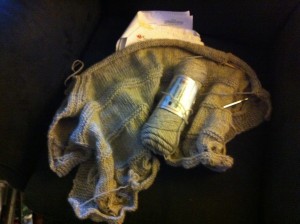What Knitting Taught Me About Writing
/I started knitting when I was in my mid-20’s. My mother is an expert seamstress and had tried to teach me to sew, but it just never took. I couldn’t muster the patience or the exactitude necessary for sewing. (Really, I hated all the ironing. I still don’t iron, unless you count tossing things in the dryer for a few minutes.) By a strange coincidence, I also started writing for a living in my mid-twenties, about four months after I cast on my first stitch.
For years, I didn’t think the two were related at all, except that when I am in a knitting phase, I’m not writing quite as much, and when I’m in a writing phase, I’m not knitting as much. If I thought of them together at all, they were competitors for my time.
But one day, one of my kids was looking at my latest project, and she said, “Wow, that sure is a mess. Are you sure you want to keep making it?”
Hold the mustard! That is something I say to myself in the middle of every single thing I write -- fiction or fundraising or email to a friend. And in that moment, I realized that all these years of knitting and writing have been far more inextricably linked than I ever knew.
The Beginning: Casting on
Every piece of knitting starts with that first cast-on stitch (Fancy expert knitters who know some fabulous technique for starting without casting on: Pipe down! I’m making a point here!), just as every piece you write starts with that first word.
Those first few rows of knitting – just like the first few sentences you write – are maddening. Full of promise of what’s to come, but messy and often confusing...and absolutely necessary to get to the good stuff. They’re never the prettiest stitches or the most beautiful prose. But they form the foundation for what is to come.
As you add row upon row, word upon word, you feel pretty good. You’re making progress! Your fingers are flying! This is AWESOME!
Until you look at your word (or row) count and realize how much further you have to go.
The Messy Middle
Which is when you get to the big slog, which looks like this:
Can you even imagine wearing that? Can you imagine wanting to?
The same thing happens when I’m writing. I get to the middle and feel absolutely certain that everything I’ve done up to that point was a complete waste of time. There are stray thoughts everywhere, paragraphs that start strong, then peter out into nothing. Structure? What structure! It’s an amorphous blob that will never amount to anything.
But I keep plugging away. Because I’ve come this far, and because I’ve done this enough times to trust that it will somehow, some way, work out.
Done, But Not Done
And then you finish. You type that last word, cast off that last stitch. It feels great, and hey! It doesn’t look half bad.
Of course, it’s not ready for prime time yet. There are all those loose plot threads to tie up and those seams – and themes – to sew up.
And this is where I really start to lose heart. I’ve spent so much time with this project – during which I’ve thought of a dozen other projects (or received a dozen new assignments) I’d rather be working on. And I’ve kind of gotten sick of even looking at this one. Why did I pick out this ugly yarn anyway? No way am I ever going to wear this monstrosity!
I know a lot of knitters – and writers – who get to this stage and simply stop. They have completed but not finished sweaters taking up space in their knitting bags. Writers have finished but not polished novels. Fundraisers have letters that could have raised big money, but instead fall flat.
But this is what knitting – such a visual and tactile medium – has taught me about the more intellectual medium of writing: DON’T GIVE UP.
That extra little effort to finish and polish and press is so worth it.






